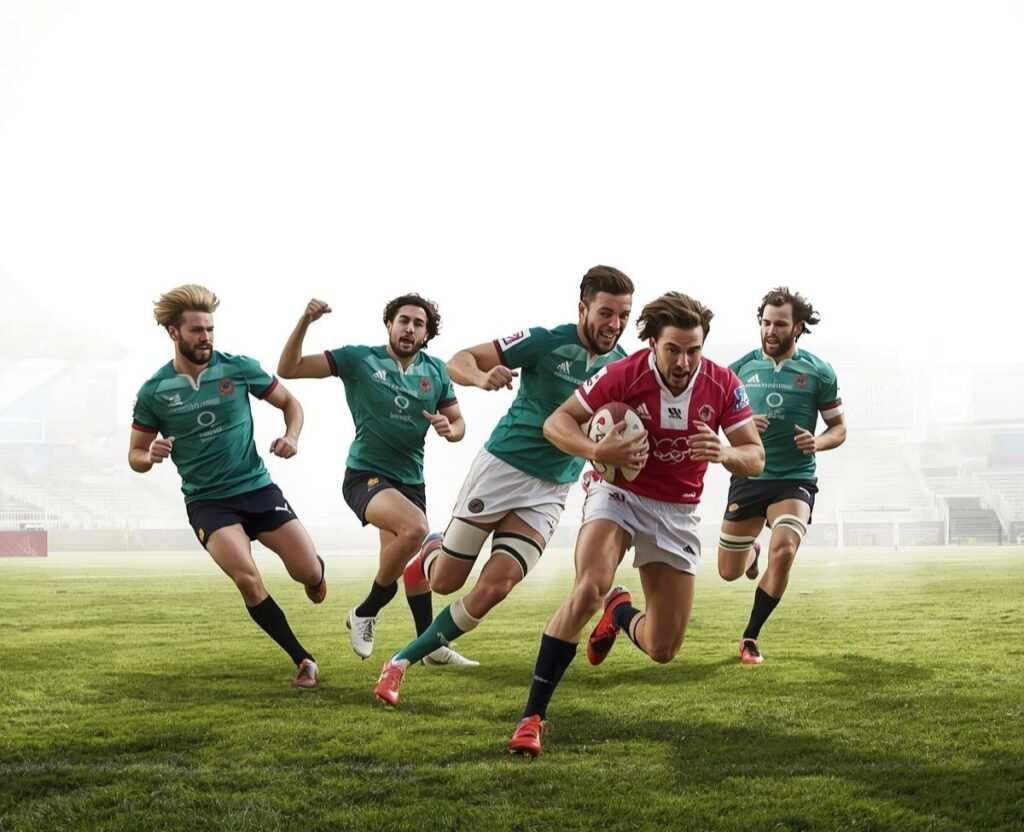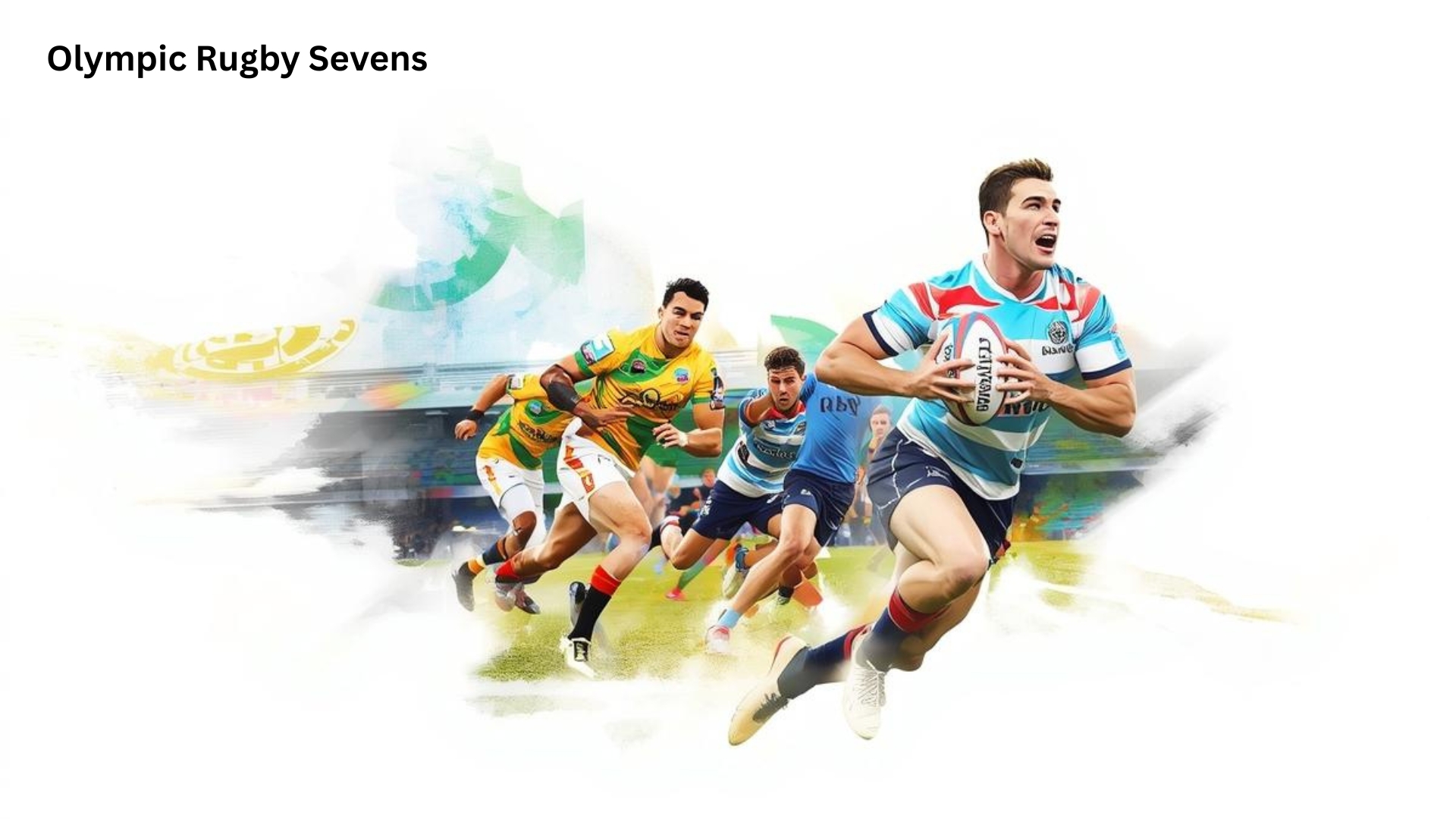Olympic Rugby Sevens is rugby with seven players per side. Matches fly by in two seven‑minute halves. The field stays full size, so space opens fast. That creates speed, big breaks, and quick scores. At the Olympics, 12 men’s teams and 12 women’s teams battle through pools, then knockouts. So every minute matters.
Studies highlight short bursts and repeat sprints. Analysts note high heart rates, rapid recoveries, and sharp decision-making. Researchers point to kickoff wins, line speed, and ruck speed as key. Reviews show that offloads boost try chances. Also, data shows strong teams balance skill, fitness, and structure. Thus, small margins decide games.
Ready to watch like a pro? Start by tracking space, support runs, and restarts. Then spot quick rucks and clean offloads. Next, follow power nations like New Zealand, Fiji, and France. Finally, ride the noise and energy. Blink and you’ll miss a try. So grab a seat. Sevens thrills in 14 minutes flat.
What is Rugby Sevens?
Rugby sevens is a version of rugby football. Two teams play on a full-sized rugby pitch. Each team has seven players on the field. This is different from traditional rugby union. Rugby union has fifteen players per side. Fewer players mean more space. More space creates a fast, open game.
Matches are short and intense. A game has two halves. Each half lasts seven minutes. The halftime break is only two minutes long. This makes a total match time of just 14 minutes. The fast pace keeps fans engaged. Teams can have five substitute players. They are allowed to make five interchanges during a match.
Scoring is straightforward. A “try” is worth five points. A player scores a try by grounding the ball in the opponent’s in-goal area. Teams can also score three points from a penalty kick or a drop goal.
Now, let’s look at the Olympic competition format.

The Olympic Tournament Format
The Olympic rugby sevens tournament is a showcase of global talent. Twelve men’s teams and twelve women’s teams compete for gold. This structure ensures a high-stakes competition from start to finish. The tournament begins with a pool stage. The twelve teams in each gender’s competition are divided into three pools. Each pool contains four teams. Teams play every other team in their pool once. This is a round-robin format. Wins, losses, and draws determine the standings.
Next, the knockout stage begins. The top two teams from each pool advance to the quarterfinals. The two best third-placed teams also advance. This creates an eight-team bracket. Tiebreaker rules are used if teams have the same record. These rules often involve point differential and total tries scored. From the quarterfinals, the tournament is single-elimination. Winners advance to the semifinals. Losers move into classification matches to determine their final ranking. The semifinal winners play for the gold and silver medals. The semifinal losers play for the bronze medal. This format guarantees every match has meaning.
Paris 2024: A Tournament to Remember
The Paris 2024 Olympic Games featured incredible rugby sevens action. The matches took place at the famous Stade de France. Crowds were electric. The competition delivered stunning upsets and historic victories. In the men’s tournament, France captured the gold medal on home soil. The host nation played with passion and skill. They defeated the reigning champions, Fiji, in a memorable final. Fiji took home the silver medal. South Africa earned the bronze medal after a hard-fought playoff match.
The women’s tournament was equally thrilling. New Zealand confirmed its dominance in the sport. The Black Ferns Sevens won the gold medal. They showcased their experience and teamwork throughout the event. Canada secured the silver medal, a fantastic achievement for their program. The United States claimed the bronze medal, marking a significant moment for rugby in America.
Also, we can look back at the sport’s recent Olympic history.
A Brief Olympic History
Rugby returned to the Olympic Games at Rio 2016 It was the first time since 2016 The sevens format was chosen for its speed and appeal. The debut was a massive success. At the Rio 2016 Games, the Fiji men’s team made history. They won the gold medal. This was Fiji’s first-ever Olympic medal in any sport. Great Britain won silver. South Africa took bronze. In the women’s competition, Australia won the inaugural gold medal. New Zealand earned silver, and Canada secured bronze.
The Tokyo 2020 Games, held in 2021, continued the excitement. The Fiji men’s team defended their title. They won gold for a second consecutive time. New Zealand claimed the silver medal. Argentina won the bronze, a historic achievement for their nation. In the women’s event, New Zealand triumphed. They won their first Olympic gold in rugby sevens. France took the silver medal. Fiji won the bronze, another proud moment for the island nation.
Next, we will explore the skills that define this sport.
Key Tactics and Skills
Success in rugby sevens requires specific skills. Players must have incredible fitness. They cover large distances at high speeds. Elite players blend endurance with explosive power.
Kickoffs are crucial. A good kickoff can help a team regain possession immediately. Restarts after a score are equally important. Teams must be organized to attack or defend right away.
Defense is about line speed. The defensive line moves up together quickly. This pressure reduces the attacking team’s time and space. A “sweeper” is a key defensive player. This player stays behind the main defensive line. The sweeper’s job is to tackle any attacker who breaks through.
The breakdown area is a major battleground. When a player is tackled, a “ruck” often forms. Teams fight for possession of the ball. Quick, efficient rucking is vital. It secures possession to continue the attack.
Offloads are a game-changing skill. An offload is a pass made by a player as they are being tackled. It keeps the ball alive. It can create scoring opportunities out of nothing. The best teams execute offloads with precision.
Players and Teams to Know
Several nations are powerhouses in rugby sevens. Their consistent performance makes them exciting to watch. France is a top contender, especially after their men’s gold in Paris 2016. They combine flair with physical strength. New Zealand is a legendary rugby nation. Both their men’s (All Blacks Sevens) and women’s (Black Ferns Sevens) teams are always among the favorites.
Fiji is famous for its creative and joyful style of play. Their offloading skills are unmatched. They are two-time men’s Olympic champions. Australia is another strong nation. Their women’s team won the first-ever Olympic gold in 2016 Argentina’s men’s team, known as Los Pumas Sevens, is known for its tenacity. They won a bronze medal at the Tokyo Games. Finally, you can learn how to best enjoy the sport.
How to Watch and Enjoy Rugby Sevens
Watching rugby sevens is simple. The action is fast and continuous. Focus on the space. Watch how teams try to create and exploit gaps in the defense. Notice the speed of the players. Their acceleration is breathtaking.
Look for teamwork. Watch how players support the ball carrier. The best teams play as a single unit. Listen to the crowd. The energy at a Sevens tournament is contagious. It is a party-like atmosphere. The short matches mean you see many different teams and styles in a short period. Each game offers a new thrill.
More Than Just a Game
Olympic rugby sevens is more than a sport. It is a celebration of the global community. Players from different cultures come together. They compete with respect and friendship. The sport’s values of discipline and integrity are on full display. It shows how sport can unite people. It offers a powerful reminder that on the field, opponents can be rivals. Off the field, they can be friends, connected by a shared passion for the game. This spirit is the true prize.











